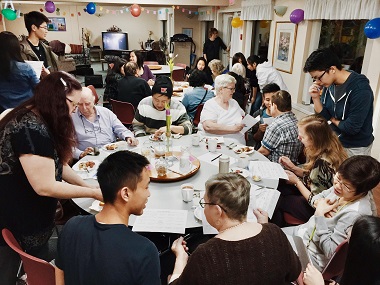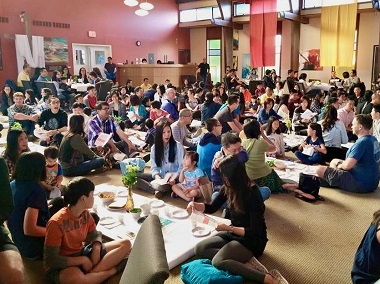
Albert Chu
Creating Conversation is a weekly editorial, curated by the Centre for Missional Leadership, and gives opportunity for people to speak about issues they believe are vital for the church in Vancouver.
One of the goals of this weekly article is to spark dialogue – and action. We invite you to join the dialogue here on the Church for Vancouver website.
We also invite you to use the article as a discussion starter with your small group, church staff, friends and your neighbours. Thanks for participating in the conversation!
My brother and I grew up with only a handful of other Asian kids in my Edmonton neighbourhood. It wasn’t always easy.
I certainly experienced my fair share of discrimination and prejudice. I was called names and often ridiculed with slant-eyed gestures. Thankfully, I didn’t get into too many fist-a-cuffs, because everyone thought I knew kung-fu (a time when racial stereotypes worked to my advantage!)
I know what it feels like to be an outsider. In my conversations with others, I’ve found that almost everyone has a story about not fitting in. The outsider’s experience is universal. It is so common that, ironically, it can be a profound way for us to understand and connect with one another. How can we build on this shared experience and create a place of welcome, diversity and inclusion?
Acts 10: inclusion

Youth and residents of the affordable seniors home next door to Tap Richmond sharing a meal.
In Acts chapter 10, there is this great story of inclusion, affectionally known as ‘Peter’s Unclean Dream.’ One day, while out on his balcony praying, Peter felt his stomach rumbling and, naturally, started to think about what to eat for lunch.
It was then that he fell in a trance and saw a vision of a huge blanket coming down from heaven stocked with an assortment of unclean animals. Then a voice came: “Take and eat!”
In response to this invitation, Peter says “No” to the Spirit. Three consecutive times – and we know that Peter has a thing with the number three – he says, “No, no, no! I’ve never so much as tasted food that was not kosher!”
It is through this divine moment that God begins to shift and widen Peter’s understanding of what it means to be the people of God.
Fast forward 20 verses. After his interaction with an Italian centurion named Cornelius, Peter utters the defining verse in the chapter:
I now realize how true it is that God does not show favouritism but accepts from every nation the one who fears him and does what is right.
Did you hear Peter’s words? He has now come to realize that God plays no favourites. Everyone is welcome! The Gospel of Jesus is the Gospel of impartiality. It is the Gospel of inclusion.
It is while Peter was speaking those very words that the Spirit fell upon Cornelius and his family. This is like Pentecost all over again! Pentecost number two! Afterwards, Peter is invited to stay, to actually live with these Gentiles for a few days, to sleep under their non-Jewish roof and to eat their non-kosher food!
And Peter says yes to this! In fact, there are two conversions that take place in this story. Yes, Cornelius’ conversion, and also Peter’s conversion! God doesn’t play favourites. This was a quantum leap for the early church. It only takes Peter 10 chapters and a crazy vision to figure this out!
Acts 1: diversity
In the Acts 1 account of the ascension, Jesus tells his disciples to go to “Jerusalem, Judea, Samaria . . . and to the ends of the earth.” Every time the church forgot; God gave them a gentle kick in the pants!
And we see this played out throughout the book of Acts:
-
-
At Pentecost, empowered through the Spirit, the disciples began to speak in different tongues and languages.
-
-
-
Then, through the martyrdom of Stephen, they are pushed out of Jerusalem and scattered throughout Judea and Samaria. As a result, more people, different people, come to faith.
-
Then, in Acts 8, when the disciples get comfortable in Samaria, God sends his Spirit to get Philip to meet an Ethiopian eunuch. Again, different culture and language.
-
As Peter and the other disciples are starting to get comfortable again, God gives Peter an amazing dream. All nations, Peter!
-
When God created humanity in His own image, he created a tapestry of people; a diversity of people who share and bear the image of God. There is this trajectory – Babel, Naaman, Ruth, the Samaritan woman, Pentecost, Acts 8 and now Peter’s vision.
This is the trajectory from beginning to end. It leads to the future reality that we read in the book of Revelation of a “great multitude, from every nation, tribe, people and language,” standing in their beauty and diversity, worshipping God together.
The truth of the matter is that racism damages our society, and our churches. What we often don’t acknowledge is that if we are not intentionally fostering communities that are widening their embrace across ethnic and racial barriers, we perpetuate the status quo and fail to live up to this future heavenly reality and the vision of Jesus.
Tapestry Church

Celebrating the Seder at Tap Richmond.
When I planted The Tapestry Church, I made diversity one of our very first values. Even through our name, we sought to intentionally become a multi-ethnic congregation, weaving diverse people into the fabric of a Christ-centred community.
Moreover, we were intentional in the ethnic representation of our leadership, and the events and programs we offered.
Yet, after only a year in this journey (it didn’t take long!), we began to realize that when one aims to be a diverse community, you cannot only aim for ethnic diversity.
When we talk about diversity, we must talk about diversity across the board. Diversity is also about being intergenerational, as we learned in managing the affordable seniors’ housing complex next door.
Diversity is about being accessible to people with physical disabilities, so we renovated our building to remove barriers and make it accessible. It is important that individuals from Bethesda (an organization with three care homes in Richmond with individuals with severe disabilities) are eager to come each Sunday, because the church is a place that welcomes them.
Diversity across the board
Again, when we talk about diversity, we must talk about diversity across the board. Of course, that includes people across different social economic strata. Admittedly, that has been the hardest for us. What does it mean to be a church not only for the comfortably middle class of Vancouver, but also for those who are marginalized?
As we look closely at the story found in Acts 10, we begin to discover something that happens underneath and behind the story, in and around the stories of conversion and Peter’s call to diversity. In fact, it’s mentioned three times in our story – and as we already know, Peter has a thing for the number three.
Three times between Acts 10:1 and 11:3, it is mentioned that Peter ate with them. This is important! In the Middle Eastern culture, sharing a meal is meaningful. Welcoming someone to your table is a sacramental act. When a meal is shared, you are considered equals around the table. Family. Sharing a meal means total acceptance of each other.
This is a story about acceptance and equality and diversity, and it is demonstrated and played out through hospitality.
Diversity and hospitality are connected. Could it be that by faithfully living out the value of hospitality, we will begin to see diversity in our churches? Many churches and pastors that I talk to desire to become more and more diverse and multi-ethnic.
Could this be the key? By building relationships with those in our community, by welcoming others into the church and into our homes for a meal, diversity will be the natural outcome.
Perhaps we need to see diversity not as a value, but an outcome. Hospitality is the value.
What does hospitality look like for you? Who do you eat with? Who do you welcome into your church and home? Are we widening our embrace?
Albert YS Chu is Director of the Centre for Missional Leadership at St. Andrew’s Hall. He is also the Lead Pastor of the Tapestry Church, a multi-campus church in the Lower Mainland.

I’m glad to see more Christian leaders in the Lower Mainland speaking on the need for diversity and inclusion in our faith communities. It’s a conversation that has been going on for since the 90s, and I am thankful for leaders like yourself and Sam Owusu for having the courage to plant intentionally multi-ethnic or multicultural churches.
The conversation is now moving towards developing intercultural church ministries in an increasingly globalized and multicultural context.
I recommend the following presentations from the recent Evangelical Missiological Society Canadian Conference:
* Sam Chaise: Intercultural Relationship as a Posture for Contextualization https://youtu.be/Vf_3_t3o3H0
* Sarah Han: Ethnic Churches as Missional Liminal Spaces for Reconciliation with the ‘Stranger’: A Missional Ecclesiology of Reconciliation for the Korean-Canadian Immigrant Church and Beyond https://youtu.be/vt1687KQ_ws
I’m curious what you do with the hospitality. What kinds of conversations do you convene with those who are welcomed? Are those welcomed heard with respect and engaged in a dialogical discernment of what our triune Creator is doing in the world and how we are being drawn into God’s care for creation?
For Canadian Presbyterians, the great affirmation of the gospel is God’s forgiving and reconciling love for the world in Jesus Christ and the fact that we have been made ambassadors of the message (2 Cor 5:19-21). Ambassadors listen and learn about the culture into which they have been sent. Christian ambassadors look for God already at work in the cultural contexts where God has and draw the attention of others to the blessings God is generating one conversation after another.
Thanks for doing this column, Albert. Looking forward to other responses.
Thank you Albert for the article, which is especially pertinent in multicultural Canada. I like how you talk about the future heavenly reality and the vision of Jesus.
I agree: Diversity and hospitality go hand in hand. With the further loosening of restrictions from the pandemic, may the church and its members have more opportunities for hospitality.
Thanks for this thoughtful article.
It was helpful to re-visit how the Lord led the church towards building diversity in the early church. However, it seems that even in the early church there was an ongoing struggle with maintaining diversity with a constant tendency to slip back into our social and ethnic and even religious ghettos.
I very much appreciated Albert’s focus on intentionality, hospitality, openness of heart and the importance of developing a tapestry of leadership as necessary foundations for growing a diverse community of believers. Having diversity as a key value also helps the community to continue to re-evaluate how change needs to occur to welcome people from every strata of society.
The leadership of a church I was associated with were asked by a congregation member if he could “sign for the deaf” during their Sunday Services. At that time they had no deaf members of the fellowship, but within a relatively short time, they had several rows of people with hearing issues attending church. Being flexible to respond wisely to initiatives from with the fellowship can also be a real strength in developing diversity.
I believe that Albert has highlighted one of the greatest challenges we have in building diversity – including people from different socio-economic backgrounds within our fellowships. Perhaps in addition to practicing hospitality, Acts 4:32 might be a challenge to our fellowships to practice a new internal Kingdom generosity which would help transform inclusivity within our church communities. Tough one!
Thanks for the article!
Thanks so much David for your comments! Especially for the story regarding your church and how such a small act of hospitality welcomed a completely different demographic and culture, namely those who are deaf and hard of hearing. I also appreciated the movement from hospitality to one of shared lives (Acts 4:32). Thanks again!